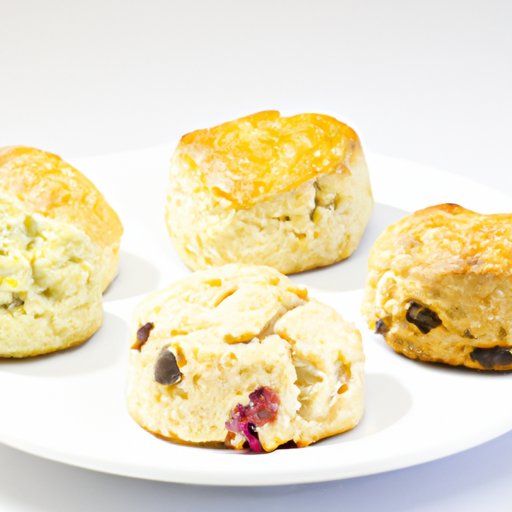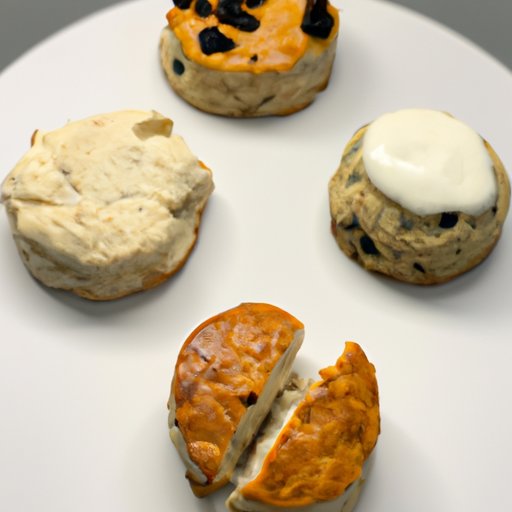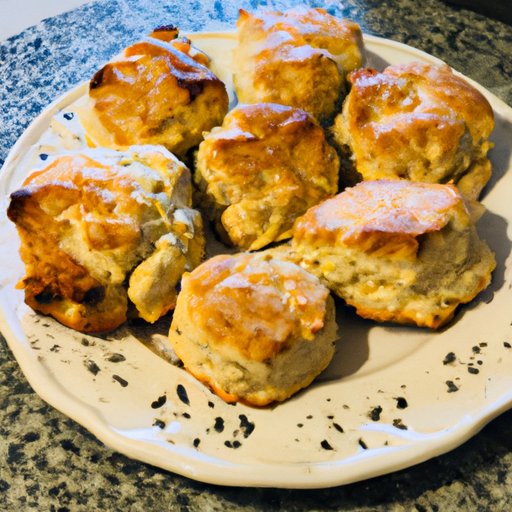Introduction
Scones are a type of quick bread that originated in Scotland. They are usually made with flour, baking powder, butter, milk, and eggs. The dough is then cut into triangular shapes and baked until golden brown. Scones can be sweet or savory and they are often eaten as part of a traditional British afternoon tea. But the question remains: Are scones healthy? This article will explore the nutritional profile of scones, the pros and cons of eating scones, the different types of scones and their nutritional value, low-fat and low-sugar scones for healthy eating, what makes a healthy scone, comparing scones to other baked goods, and whether it is possible to make a healthy scone at home.

Nutritional Profile of Scones: Examining the Health Benefits
When it comes to nutritional value, scones are not particularly high in any nutrient. A single scone contains around 200 calories, 10g of fat, 25g of carbohydrates, 2g of dietary fiber, and 4g of protein. They also contain trace amounts of vitamins and minerals such as iron, calcium, and potassium. While scones are not necessarily unhealthy, they are not especially nutritious either. However, there are some health benefits associated with eating scones. For example, the carbohydrates in scones can provide a boost of energy and the protein in scones can help to keep you feeling full for longer.
Exploring the Pros and Cons of Eating Scones
When it comes to the pros and cons of eating scones, it’s important to consider both sides. On one hand, scones can be a tasty treat that can fit into a balanced diet. They are also relatively easy to make and can be enjoyed as part of a traditional afternoon tea. On the other hand, scones are high in calories and fat, which means that they should be enjoyed in moderation. Furthermore, many store-bought scones contain added sugar, which can have negative health effects if consumed in excess.

A Look at the Different Types of Scones and Their Nutritional Value
There are many different types of scones available, from plain scones to fruit scones to savory scones. All of these scones have slightly different nutritional profiles. For example, plain scones contain fewer calories than fruit scones, but they also have less dietary fiber. Fruit scones contain more calories, but they also contain more vitamins and minerals due to the addition of fruit. Savory scones, meanwhile, are typically made with whole grain flour, which can provide more dietary fiber and protein than plain or fruit scones.
An Overview of Low-Fat and Low-Sugar Scones for Healthy Eating
Low-fat and low-sugar scones can be a great option for those who want to enjoy a tasty treat without compromising on their health. Low-fat scones are typically made with reduced-fat ingredients such as low-fat milk and yogurt, while low-sugar scones are usually made with natural sweeteners such as honey or maple syrup. Both of these options can provide a tasty treat without all of the extra calories and fat found in regular scones.
What Makes a Healthy Scone?
If you want to make a healthy scone at home, there are a few things to keep in mind. First, use whole wheat flour instead of white flour, as it is higher in fiber and other nutrients. Second, use unsaturated fats such as olive oil or coconut oil instead of butter. Third, use natural sweeteners such as honey or maple syrup instead of refined sugar. Finally, add fresh or dried fruits for an extra boost of vitamins and minerals.
Comparing Scones to Other Baked Goods: What’s Healthier?
When it comes to comparing scones to other baked goods, it’s important to look at the nutritional value of each item. Generally speaking, scones are not as healthy as other baked goods such as muffins or cakes. Muffins and cakes tend to have more complex carbohydrates, fiber, and protein than scones, making them a better choice for those looking for a healthier snack. Additionally, many muffins and cakes are made with whole grain flours, which can provide more nutrients than white flour.
Is it Possible to Make a Healthy Scone at Home?
Yes, it is possible to make a healthy scone at home. By using whole wheat flour, unsaturated fats, natural sweeteners, and adding fresh or dried fruits, you can create a scone that is both delicious and nutritious. Plus, making your own scones at home can be a fun activity for the whole family!
Conclusion
In conclusion, scones can be a tasty treat that can fit into a balanced diet. However, they are high in calories and fat, so they should be enjoyed in moderation. Additionally, many store-bought scones contain added sugar, which can have negative health effects if consumed in excess. Those looking for a healthier option should opt for low-fat and low-sugar scones, or make their own scones at home using whole wheat flour, unsaturated fats, and natural sweeteners. Ultimately, scones can be a healthy snack when enjoyed as part of a balanced diet.
(Note: Is this article not meeting your expectations? Do you have knowledge or insights to share? Unlock new opportunities and expand your reach by joining our authors team. Click Registration to join us and share your expertise with our readers.)
